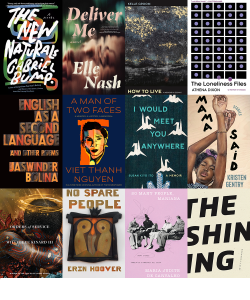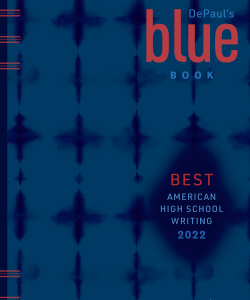Page One: Where New and Noteworthy Books Begin

The first lines of a dozen noteworthy books, including Orders of Service: A Fugue by Willie Lee Kinard III and I Would Meet You Anywhere by Susan Kiyo Ito.
Jump to navigation Skip to content

The first lines of a dozen noteworthy books, including Orders of Service: A Fugue by Willie Lee Kinard III and I Would Meet You Anywhere by Susan Kiyo Ito.

DePaul University’s Blue Book anthology showcases the work of talented teen writers, offering an intimate glimpse into their varied lived experiences and illustrating the transformative power of written expression.
The poems in Dorothea Lasky’s The Shining, published by Wave Books in October, portray the physical and psychological horrors that take place in the labyrinthine Overlook Hotel, the setting of the iconic Stephen King novel and Stanley Kubrick film adaptation. Lasky guides readers into the hotel of her imagination in the opening poem, “Self-Portrait in the Hotel”: “When I checked into this / Godforsaken hellhole / They locked me in the tiny yellow room / With no belongings but my lipstick,” she writes. Throughout the book, Lasky meditates on the many horrors of simply being alive, finding inspiration in the hotel’s high ceilings, the Gold Ballroom, and the final shot of the film featuring a terrifying photograph of the protagonist, Jack Torrance, in the ballroom in 1921. Take note of Lasky’s ekphrastic practice and write a poem that places you in the setting of your favorite film. What conflicts come to mind in this newly imagined world?
Calling all poets! The time is right to submit to the Alice James Award. Given annually for a poetry collection, the award confers a prize of $2,000 and publication by the celebrated independent press Alice James Books. Both emerging and established poets are eligible to receive the prize. Submissions are open through October 16.
Submit a manuscript of 48 to 100 pages with a $30 entry fee. All entries are considered for publication. Visit the website for complete guidelines.
Established in 1973 and named for writer and feminist hero Alice James, Alice James Books “is committed to collaborating with literary artists of excellence whose voices have been historically marginalized.” Previous winners of the Alice James Award include Lee Kinnard III, for Orders of Service; Ina Cariño, for Feast; and Aldo Amparan, for Brother Sleep.
“Books aren’t dangerous. At least, they’re not dangerous to those of us who want to create an equitable and just society,” says author Ibram X. Kendi in this Washington Post video which takes a look at the history and common themes of banned books in America.
In 1950, Alan Turing devised a test that could assess the intelligence of computers and determine if they were capable of sentient thought—an uncertainty that lingers as artificial intelligence (AI) continues to develop. Franny Choi’s poem “Turing Test,” published in the Summer 2016 issue of the Poetry Review, plays with this subject of identity and consciousness. The poem responds to objective questions posed by an AI entity, including, “How old are you?” with elaborate answers that reveal more about the speaker. “My memory goes back 26 years / 23 if you don’t count the first few / though by all accounts i was there / i ate & moved & even spoke,” writes Choi. Write a poem in which your speaker, whether AI or not, answers unassuming questions, such as, “Where did you come from?” and “Do you believe you have consciousness?”
“[Los Angeles is] part of an international community. The city has allowed tremendous growth for me, in terms of its cultural outlets, from libraries, great cinema, dance, orchestra, interesting mixes of people.... I see myself as a global citizen and a global writer.” Will Alexander, winner of the 2016 Jackson Poetry Prize, talks about the influence the city of Los Angeles has had on his relationship with language and writing.
If you’re a poet looking for publication or time to develop a project, you have just over two weeks to prepare work for a variety of contests with a deadline of October 15. A scholarship offers U.S. poets $66,500 “for a year of travel and study outside of North America” and has no entry fee. Three prizes of $1,000 and publication are being offered for poetry collections. And for those who don’t have a full-length collection ready, a prize of $1,000 is also being awarded for a group of poems. Now it’s a matter of picking which opportunity is right for you!
Amy Lowell Poetry Traveling Scholarship
An award of approximately $66,500 is given annually to a U.S. poet for a year of travel and study outside of North America. Entry fee: None.
Fordham University at Lincoln Center
Poetic Justice Institute Prizes
Two prizes of $1,000 each and publication by Fordham University Press are given annually for poetry collections. The winners also receive a publicity consultation and a virtual or in-person book launch at Fordham–Lincoln Center in New York City. All writers are eligible for the Poetic Justice Institute Prize; the Poetic Justice Institute Editor’s Prize is given to a poetry collection by a BIPOC writer. Eligible writers may enter both contests. Srikanth Reddy will judge the Poetic Justice Institute Prize and Elisabeth Frost will judge the Poetic Justice Institute Editor’s Prize. Entry fee: $28.
Silverfish Review Press
Gerald Cable Book Award
A prize of $1,000, publication by Silverfish Review Press, and 25 author copies is given annually for a first poetry collection. All entries are considered for publication. Entry fee: $25.
Tennessee Williams & New Orleans Literary Festival
Poetry Contest
A prize of $1,000 is given annually for a group of poems. The winner will also be invited to give a reading at the Tennessee Williams & New Orleans Literary Festival in March 2024. Writers who have not published a poetry collection are eligible. Entry fee: $15.
Visit the contest websites for complete guidelines, and check out the Grants & Awards database and Submission Calendar for more contests in poetry, fiction, creative nonfiction, and translation.
Earlier this month, the Royal Observatory in Greenwich, London, announced its list of winners for their astronomy photographers of the year awards. The photographs, which were published in the Guardian, show various perspectives of observing the cosmos. In the overall winning photograph created by a team of amateur astronomers, a huge plasma arc shines next to the swirling Andromeda galaxy. In the young astronomy photographer category, the Running Chicken Nebula is captured, a diffused glow of crimson, violet, and black gases shining amidst a cluster of white stars. The photographs taken from Earth show the unexpected manifestations of space seen in our sky, as one features rare cloud formations in Hungary and another captures the orbital rotation of stars forming an infinite circle in Lancashire, England. This week write a poem inspired by these photographs that meditates on your place in the universe. For inspiration, read Tracy K. Smith’s poem “My God, It’s Full of Stars.”
Before you go out to buy your Halloween pumpkin, consider submitting to Action, Spectacle’s Poetry & Prose Prize for a chance to win $1,000 and publication. English translations of works originally written in another language are accepted.
Using only the online submission system, submit any number of poems totaling no more than 10 pages or up to 8,500 words of a novel or nonfiction excerpt, short story, or essay with a $20 entry fee by October 1. Visit the website for complete guidelines.
Action, Spectacle is a biannual online magazine of art and culture based in Louisville, Kentucky, and Brooklyn, New York. The magazine has featured comics by Anne Carson, poetry by Douglas Kearney, and prose by Brandon Taylor, among other selections in art, commentary, fiction, interviews, memoir, verse, and reportage.